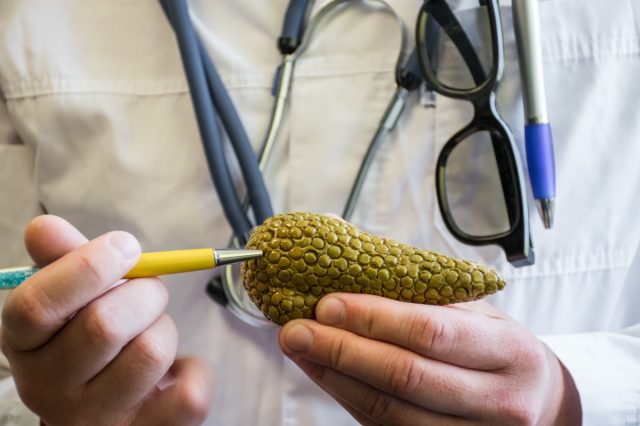The pancreas is a crucial organ that doesn't get much attention until something goes wrong. A gland located behind the stomach, it's responsible for releasing enzymes needed for digesting food and producing insulin, a hormone that regulates blood sugar levels. When a condition known as pancreatitis develops, it can cause serious health problems and may even be fatal. These are the signs of pancreatitis, according to physicians.
What Is Pancreatitis?

"Pancreatitis is a serious health condition in which the pancreas of an affected individual becomes inflamed," says Mark Davis, MD, a physician with Pacific Analytics. "In this disease, the digestive enzymes start attacking the pancreas, and over time, the pancreas gets completely damaged. The inflamed pancreas can further result in inflammatory cells and toxins, increasing the risk of lungs, heart and kidney damage."
Left untreated, severe pancreatitis can be a life-threatening condition.
What Causes Pancreatitis?

According to the Mayo Clinic, pancreatitis may be caused by
- Gallstones
- Alcoholism
- Medications
- Pancreatic cancer
- High levels of triglycerides (a type of fat) or calcium in the blood
- Infections
- Abdominal injury
- Obesity
- Trauma
What Are The Signs You Have Pancreatitis?

Most people with acute pancreatitis have persistent, severe pain in their upper abdomen right below the ribs, says Alex Spinoso, MD, of Genesis Lifestyle Medicine in Las Vegas, Nevada.
In pancreatitis caused by gallstones, the pain is often very localized and comes on quickly, reaching maximum intensity in 10 to 20 minutes. With pancreatitis caused by alcohol or certain health conditions, the pain may be less abrupt and more general.
"In approximately 50 percent of patients, the pain radiates to the back," says Spinoso. "The pain persists for several hours to days and may be partially relieved by sitting up or bending forward. Approximately 90% of patients have associated nausea and vomiting which may persist for several hours."
According to Davis, other symptoms of pancreatitis include:
- Swollen and tender abdomen
- Irregular pulse
- Fever
- Smelly stool
- Aggravated abdominal pain after eating a meal
A small percentage (about 5 to 10 percent) of people who have acute severe pancreatitis may experience no pain with the condition.
What Are The Risks of Pancreatitis?

Pancreatitis can be a serious, even fatal, condition. "Chronic pancreatitis can cause long-term complications, including diabetes, weight loss, bile duct blockages, chronic pain and even pancreatic cancer," says Davis. "Therefore, it is very important to identify the early symptoms of pancreatitis and begin treatment as soon as possible."
When To See a Doctor

"Anyone who experiences frequent and severe abdominal pain should see a doctor immediately," says Davis. Pancreatitis may need to be treated in the hospital with pain medication and IV fluids. You may need to undergo procedures to remove bile duct obstructions, gallstones, or part of the pancreas itself. Long-term, your doctor may recommend changing your diet, avoiding alcohol, taking supplments to improve your digestion, or changing medications that are causing pancreatitis.
No comments:
Post a Comment